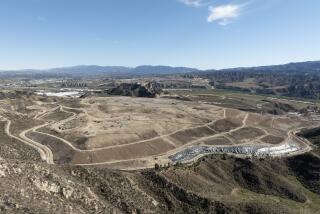Nevada Governor Vetoes Nuclear Waste Dump Site
- Share via
LAS VEGAS — Nevada Gov. Kenny Guinn on Monday vetoed the use of Yucca Mountain as the nation’s underground repository of highly radioactive nuclear waste, declaring that the $60-billion proposal is “based on bad science, bad law and bad public policy.”
In February, President Bush recommended to Congress that Yucca Mountain, 90 miles northwest of Las Vegas, serve as a permanent burial ground for the nation’s 77,000 tons of spent nuclear fuel.
“Let me make one thing clear, crystal clear in fact. Yucca Mountain is not inevitable,” Guinn told supporters Monday at the University of Nevada.
“We will expose the Department of Energy’s dirty little secrets about Yucca Mountain,” Guinn said, charging that the government had not studied the dangers of transporting the waste across the country.
Guinn said the nuclear power industry has spent $100 million in support of Yucca Mountain and he asked each Nevadan to send in $1 to help counter that offensive.
The Republican governor later headed to Washington, where his “notice of disapproval” will be filed with both houses of Congress.
Guinn’s veto was allowed under a nuclear waste policy act Congress wrote in 1982, which gives the governor of a targeted state the power to reject the president’s selection. Congress will have the final say, however. It has 90 legislative days to debate the issue, and a vote is expected in July.
If simple majorities in the House and Senate vote to override Guinn’s veto, the Nuclear Regulatory Commission would decide in a few years whether to license the project. The project could still be derailed by litigation.
Opponents say the House probably will vote to support the project, which already represents a $6-billion government investment. They are hoping it will be rejected by the Senate.
Senate Democratic Whip Harry Reid of Nevada said most Senate Democrats have promised to support his state. But at least 15 votes from the GOP side will be needed to uphold Nevada’s veto, and so far only two--John Ensign, a freshman from Nevada, and Ben Night-horse Campbell of Colorado--have opposed the plans.
Scientists Revise Feasibility Study
Congress decided 15 years ago to consider only Yucca Mountain for nuclear waste disposal, and the Department of Energy has concluded that the site is feasible.
Government scientists initially believed that the geology of Yucca Mountain was sufficient to contain radioactivity. They have now concluded that it will provide little more than a web of underground storage tunnels and that protection from radiation will depend on the millenniums-long durability of man-made containers to protect the material from, among other things, corrosive moisture and the possibility of earthquakes.
Both sides have lined up heavyweight lobbyists. Arguing against the use of Yucca Mountain are John D. Podesta, a former chief of staff for President Clinton, and Kenneth M. Duberstein, former chief of staff for President Reagan. The nuclear industry enlisted the help of John H. Sununu, former chief of staff for the senior President Bush, and Geraldine A. Ferraro, the onetime vice presidential candidate.
Nevada, in a media campaign targeting states where senators are waffling, will hammer on the theme that the transportation of radioactive waste across the country will create “nuclear neighborhoods.”
The campaign “will educate Americans and help senators who are inclined to support us but don’t feel they can because they don’t sense support back home to oppose Yucca Mountain,” said Reid spokesman Nathan Naylor.
Grass-roots efforts to kill the Yucca Mountain project also are underway. A coalition of 16 organizations, including the Sierra Club, the Natural Resources Defense Council and Physicians for Social Responsibility, sent a letter to senators March 26 imploring them to reject the project because of unresolved scientific questions.
Activists from 25 states are planning to converge on Washington next Tuesday to argue against Yucca Mountain, said Lisa Gue, a policy analyst for the consumer advocacy organization Public Citizen.
Senators face a political dilemma in considering the best interests of their own states when deciding the fate of Yucca Mountain.
Many agree with Bush and Energy Secretary Spencer Abraham, who concluded that the nuclear industry and the public are better served by shipping spent fuel rods--which will remain radioactive for 250,000 years--to Yucca Mountain. The waste is now stored at 131 facilities in 37 states.
That strategy, the Bush administration says, will allow for better long-term security of the lethal material, especially in a post-Sept. 11 environment.
But those same senators may wince at the notion of trains and trucks transporting nuclear waste across their states, where it could be vulnerable to accident or attack.
In his 10-page argument to Congress, Guinn pointed out that, even as about 100,000 waste shipments head to Yucca Mountain over three decades, new waste will be generated and will have to be stored at those sites to cool before it can be shipped elsewhere.
Thus, Guinn argued, Yucca Mountain will not eliminate the existence of nuclear waste around the country.
More to Read
Sign up for Essential California
The most important California stories and recommendations in your inbox every morning.
You may occasionally receive promotional content from the Los Angeles Times.










